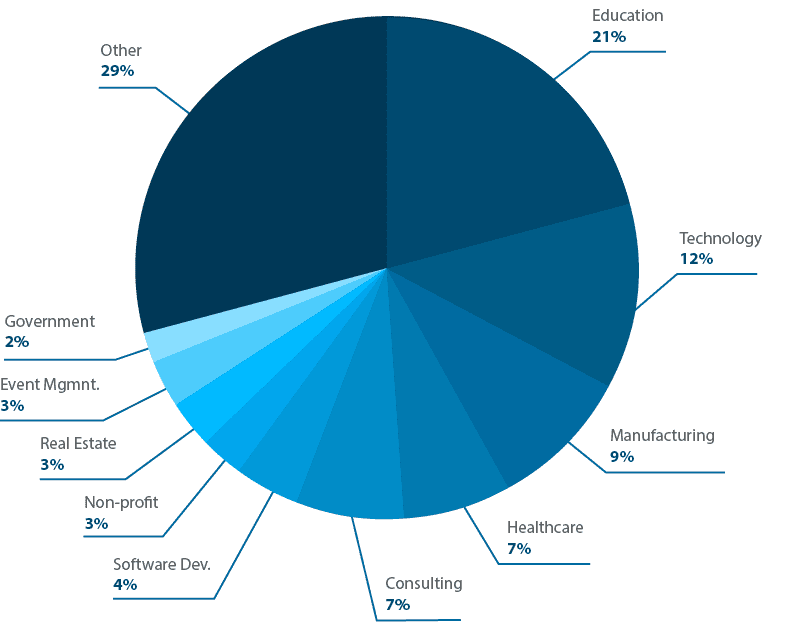With the application of technology to the education and learning goals and introduction of e-learning, the ways for teaching, training, and skill development have transformed to a whole new level.
E-learning has been in the market for 22 years now and corporates have leveraged this technology through software and tools like learning management systems for years now. Statistics reveal that 42% of the companies using e-learning solutions have seen revenue growth with increased employee productivity and retention. 72% of the organizations admit to have achieved a competitive edge with the use of e-learning solutions.
Talking about the growth of corporate e-learning, it has developed by a whopping 900% between 2001 to 2017.
Despite these benefits and success of e-learning solutions and Learning Management Systems, a shocking fact comes forward. Many organizations are still stuck with their traditional approaches and not convinced for the implementation of e-learning solutions or Learning Management Systems.
Here is a graph that shows the percentage of LMS implementation and usage across various industry verticals.

Source: https://www.capterra.com/learning-management-system-software/user-research
The graph makes it clear that the percentage of usage of e-learning solutions among major industry verticals is extremely low. This is a surprising detail owing to the fact that learning management systems were introduced more than 15years ago, yet a bare minimum of organizations have considered them for the skill development and learning requirements of their staff.
The big question here is what makes the businesses pull back on using e-learning solutions even after such exceptional developments and stunning growth prospects?
The simple answer is “CHALLENGES.”

10% of the organizations find it challenging to Scale their LMS Platform.
27% of the organizations face challenges with LMS due to Lack of Knowledge.
27% of the organizations find it challenging to Integrate their Systems with LMS.
36% of the organizations find it challenging to measure their ROI from LMS.
The above challenges come as a big roadblock to the development of e-learning solutions and Learning Management Systems.
The learning knowledge and structures, without a doubt, go way beyond the traditional classroom settings with the use of Learning Management Systems and other e-learning tools. They seamlessly bring education, training, and courses at your fingertips. However, the challenges encompassing the organizations in considering the implementation of these solutions cannot be overlooked.
Moreover, the ignorance to these challenges would only mean that your organization is not able to take the full benefit of e-learning solutions. So, here, we have made a critical analysis of the aforementioned challenges and desirable solutions to make e-learning more sustainable, scalable, and profitable.
Challenges in Implementation of LMS and Its Solution
Inability to Scale LMS Platform
In a survey, 10% of the organizations mentioned that inability to scale the LMS platform comes as a major challenge in leveraging good e-learning experiences. As the organization grows, there are requirements for more features, functionalities, better modules, and courses, etc. The LMS needs to keep pace with the growth of organization as well as growth in modern technology. If not, then it will impact the learning experiences. This is an issue with proprietary LMS software. They are not able to keep up and become challenging due to limitations and compatibility issues.
“Replace the Proprietary LMS with Open Source LMS.”
Open Source technology has unlimited ability to scale. The original source code is freely available and you can change and modify it as per your requirements. So, you have the flexibility to add features and functions. This is generally done with the use of plugins and extensions. There are innumerous plugins to add advanced functionalities such as interactive video content, virtual reality, automation, etc., to the LMS software.
With the limitless possibilities of using open source software, the scalability you need to achieve with LMS and e-learning solutions will come freely and readily to you.
Lack of Knowledge
In 27% of the organizations, people have no idea how to use the LMS. Even if they learn the basics, there is a vast difference between just using software and leveraging it to the best of its capabilities. Many times, the onboarding is easy, but the additional cost for educational and learning support can be way too hefty. Figuring out how to make the best use of LMS will require technical skills and knowledge which the organizations generally lack.
“Find a service provider that includes ongoing education and training for use of LMS in its package.” This is an easy way out. It could be difficult, but surely not impossible. There are many service providers who not only specialize in development of Learning Management Systems but also in providing ongoing education and training for the best use of software to cater to higher learning experiences.
System Integration Issues
As an organization, it is not just one single e-learning solution or LMS you would use. There are other systems and software as well and those need to be synced with the LMS and e-learning solution. But this could be a major challenge, even with the most basic LMS software. You need to make the courses compatible with LMS. It is a challenge in itself and it is going to become more challenging as you move on to more complex systems such as e-commerce and analytics integrations. This can require a lot of manual labor and time. Additionally, it can hamper the user experiences to a significant level.
“Implement fully-integrated Learning Management Systems.”
There are fully integrated LMS available that you can implement to eliminate this challenge. However, you need to look into your specific needs and requirements before choosing such LMS. Consider your objectives, prepare a list of features and system integrations you require, and then invest in the implementation and utilization of LMS.
Inability to Measure Return on Investment (ROI)
As an organization, your focus is on the returns. You want to create the most value for every investment you make. However, 36% of organizations are of the opinion that they are unable to measure their ROI from learning management systems. Measuring the quantitative as well as qualitative return from the e-learning initiatives always comes as a challenge and it often becomes difficult to justify the budget for it.
A place for big ideas.
Reimagine organizational performance while delivering a delightful experience through optimized operations.

“Use analytics and reporting for tracking progress and ROI.”
The technology has advanced and there are analytics and reporting functions for almost everything. You can easily track the quantitative as well as the qualitative progress and growth from your e-learning solutions and find significant ease in managing the ROI. Additionally, you can use these reports to plan and implement the improvements required to drive future growth.
Conclusion
E-learning is on the rise and with its growth and development, organizations are continuously benefitting from it. With e-learning solutions, 42% of organizations have been able to enhance their revenue with employee engagement boosted by as much as 18%. The statistics reveal that with every one dollar invested in e-learning solutions, organizations can get a return of up to $30 due to increased productivity.
Learning Management Systems provide a competitive edge to the organizations and in fact, 72% of organizations using such solutions have acknowledged this.
The technology does have its challenges, but there are very easy solutions to overcome them. If challenges of LMS are what is keeping you on the backfoot, then here you have found all the solutions to the major challenges. So, what are you waiting for?
Get a Learning Management System now to leverage technology and drive growth and revenues.
If you are looking for a service provider or an LMS developer, we may as well help you with that. We, at Zehntech, hold expertise in creating learning management systems and other e-learning solutions. In fact, we have one implemented in our internal organization as well. Find more details about our solutions here.












